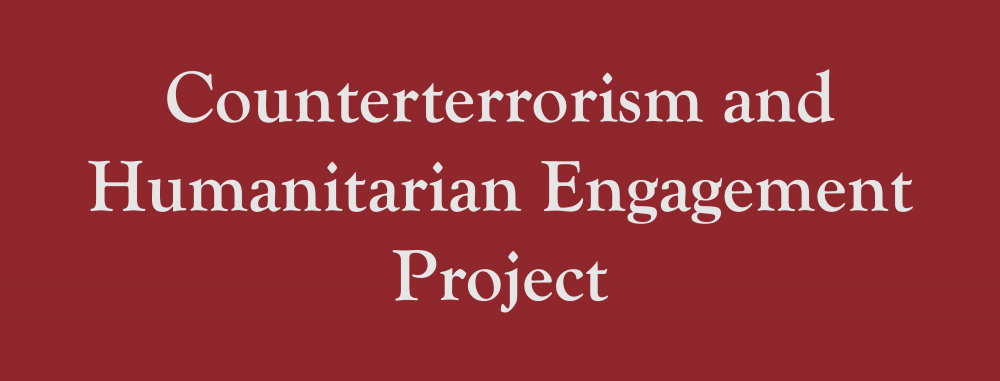Academic and policy research is a foundational component of the the Counterterrorism and Humanitarian Engagement Project. The Project’s research portfolio cuts across four interconnected domains — international humanitarian law, international human rights law, counterterrorism and security norms, and regulatory approaches — in exploring the aims and effects of criminalization of humanitarian action in armed conflicts involving non-state armed groups.
The CHE Project undertakes legal research with a view to policy-relevant outcomes. The Project’s research is driven by operational, policy, and legal issues faced by the humanitarian and donor communities.
The CHE Project has published the following documents as part of its Research and Policy Publications series:
- A Research and Policy Paper by Sean Watts titled “Under Siege: International Humanitarian Law and Security Council Practice concerning Urban Siege Operations” (May 2014);
- A Research and Policy Paper analyzing Contemporary Counterterrorism-related Clauses in Humanitarian Grant and Partnership Agreement Contracts (May 2014);
- A Research and Policy Paper analyzing Contemporary Anti-Diversion Policies and Practices of Humanitarian Organizations (May 2014);
- A Research and Policy Paper by Neal Cohen, Robert Hasty, and Ashley Winton on “Implications of the USAID Partner Vetting System and State Department Risk Analysis and Management System under European Union and United Kingdom Data Protection and Privacy Law” (March 2014);
- A Research and Policy Paper on Partner Vetting in Humanitarian Assistance: An Overview of Pilot USAID and State Department Programs (November 2013);
- A Background Briefing on Congressional Inquiries (March 2013);
- A Background Briefing on Counterterrorism and Humanitarian Engagement in Somalia and Mali (March 2013);
- A Research and Policy Paper on Enterprise Risk Management: A New Approach to Managing the Risks Posed by Counterterrorism Regulations (March 2013); and
- A Background Briefing on OFAC Licensing (March 2013).
RESEARCH DOMAINS
International Humanitarian Law
In situations of armed conflict, international humanitarian law (IHL) — also knows as the law of war and the law of armed conflict — addresses the issue of humanitarian organizations seeking to reach vulnerable civilians under the control of non-state armed groups (as well as states). IHL indicates that, at a minimum, “An impartial humanitarian body … may offer its services to the Parties to the conflict.”
To better understand the obligations and considerations of states, non-state armed groups, and humanitarian actors, the Counterterrorism and Humanitarian Engagement Project seeks to explore the manifold facets of the relationship between IHL’s protections of neutral, impartial, and independent humanitarian assistance, on the one hand, and counterterrorism laws and policies, on the other. Simultaneously, IHL protects humanitarian action, constrains states, and regulates the boundaries of the battlefield. IHL seeks to secure a balance between humanitarian access and protection of relief workers, on the one hand, and security of state actors, on the other. Yet states that promulgate IHL are also promulgating counterterrorism laws, and these counterterrorism laws may give rise to dilemmas for states seeking to both uphold their IHL obligations and implement their counterterrorism laws.
International Human Rights Law
As part of its efforts to identify and develop sustainable, principled, and practical solutions to the challenge of large-scale humanitarian operations conducted in areas where listed armed groups are active and counterterrorism laws affect humanitarian action, the Counterterrorism and Humanitarian Engagement Project undertakes legal research and policy analysis concerning international human rights law (IHRL). Alongside international humanitarian law, IHRL helps to shape the normative environments often arising at the intersections between counterterrorism norms and humanitarian principles in situations of non-international armed conflict.
Counterterrorism and Security Norms and Practices
One of the four key research domains of the Counterterrorism and Humanitarian Engagement Project, counterterrorism norms have the potential to affect humanitarian actors in myriad ways. Regulation of the non-profit sector (including, perhaps especially, the humanitarian sector) is an area of focus and scrutiny that is likely to remain on the forefront of political agendas, in light of developments in the character and nature of — as well as the actors responsible for perpetrating — acts of terrorism committed during and outside of armed conflict. While robust protection of humanitarian principles is an imperative concern, the CHE Project recognizes that policy responses are more likely to be successful if those responses take security concerns of governments seriously.
Regulatory Approaches
Risk mitigation and compliance strategies are increasingly seen as a potential policy avenue to pursue in order to more effectively harmonize security concerns with humanitarian principles. Across a range of industries, due diligence and risk mitigation processes and approaches have been devised to help balance seemingly competing concerns, and those processes and approaches may provide helpful points of departure for humanitarian actors to consider in addressing the complex issues arising at the intersections of counterterrorism norms and humanitarian principles.
